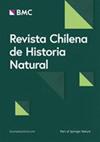Density-dependent effect of allelopathy on germination and seedling emergence in two Ipomoea species
IF 1.3
4区 环境科学与生态学
Q3 BIODIVERSITY CONSERVATION
引用次数: 4
Abstract
BackgroundDensity in inter and intraspecific plant-plant interactions affects the action modes of allelopathy (autotoxicity, negative and positive allelopathy). Some seeds exude compounds that inhibit the germination of others. Ipomoea murucoides and I. pauciflora are sympatric tree species that form patches at the local scale where one or the other dominates, possibly due to allelopathy in the seeds. The objective of this study was to determine the possible density-dependence of the allelopathic effect among seeds of these species through the measure of seed germination and seedling emergence.MethodsIn both species, allelopathy was measured as: a) germination in mixed sowing of both species at different proportions, b) germination in single-species trials at different densities after adding seed extracts of both species, and c) seedling emergence in seed mixtures of both species sown at different proportions beneath canopies of the two Ipomoea species.ResultsSeed germination of I. murucoides was increased by the presence of I. pauciflora and diminished at higher densities of its own seeds; however, seed germination of I. pauciflora was not affected by the presence of I. murucoides seeds. The addition of extracts (either from conspecifics or congeneric) diminished the germination of both species and at higher seed densities the germination was lower. Seedling emergence did not depend on the species under which the seeds were sown nor on the density of the seeds.ConclusionsThe germination experiments evidenced positive allelopathy and/or autotoxicity, while there was no evidence of allelopathic effects in seedling emergence. The allelopathic activity is reported in the seeds of these species for the first time.化感作用对两种薯蓣种子萌发和出苗的密度依赖效应
种间和种内植物-植物相互作用的密度影响化感作用的作用模式(自毒性、负性和正性化感作用)。有些种子散发出抑制其他种子发芽的化合物。在局部尺度上,Ipomoea murucoides和I. pauciflora是同域树种,可能是由于种子的化感作用而形成斑块,其中一方占主导地位。本研究的目的是通过种子萌发和出苗的测量来确定这些物种的化感作用在种子之间可能的密度依赖性。方法将化感作用测定为:a)两种不同比例混合播种时的萌发率,b)添加两种种子提取物后不同密度单种试验时的萌发率,c)两种不同比例混合种子在冠层下播种时的出苗率。结果杜鹃种子的萌发率随杜鹃种子密度的增加而增加,随杜鹃种子密度的增加而降低;然而,杜鹃种子的萌发不受杜鹃种子存在的影响。同种或同源植物提取物的添加降低了两种植物的发芽率,种子密度越高,发芽率越低。幼苗的出苗不取决于播种种子的种类,也不取决于种子的密度。结论种子萌发实验显示化感作用和/或自毒性,而幼苗出苗无化感作用。这些植物的种子具有化感作用尚属首次报道。
本文章由计算机程序翻译,如有差异,请以英文原文为准。
求助全文
约1分钟内获得全文
求助全文
来源期刊

Revista Chilena de Historia Natural
环境科学-生态学
CiteScore
2.50
自引率
18.20%
发文量
9
审稿时长
>36 weeks
期刊介绍:
Revista Chilena de Historia Natural (RCHN) publishes original research dealing with past and present phenomena from organismic to higher levels of biological organization, considering both empirical and theoretical studies on all kinds of taxa and environments.
The major areas covered by RCHN are: botany and zoology; physiological and behavioral ecology; population biology; community and ecosystem ecology; systematics, biogeography and evolution.
 求助内容:
求助内容: 应助结果提醒方式:
应助结果提醒方式:


